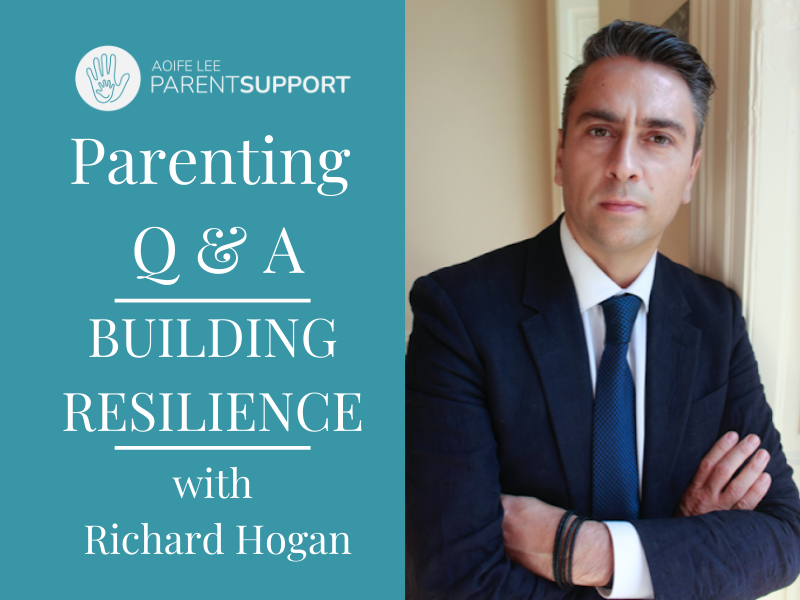PARENTING Q & A | HOW TO HELP CHILDREN BUILD RESILIENCE WITH RICHARD HOGAN
As life and society start to re-open it’s safe to say this past year has been tough on everyone. Huge upheaval to our daily lives, a significant change in routine, school life, socially, emotionally and work. Both children and adults have had their good days and bad days – Covid has impacted all our lives. But what has it taken for us to get through it?
When Richard Hogan, Family Psychotherapist & author of the best-selling book ‘Parenting the Screenager’ spoke to me about children and their resilience it was a great opportunity to go through what it’s all about and why it’s so important? The realities of what has impacted children the most, highlighting sleep and gaming being a big disruption. I also asked him what can a parent do to support their child if their confidence has been knocked? And some top tips on what parents can do at home to encourage resilience in their children.
“The adult world is a difficult landscape to navigate at the best of times, your child must be ready for the ups and downs’ of that world. When they learn that they are competent and able, they will embrace adversity not as something to be feared or collapse under but rather deal with it in a confident way”
How to encourage your child to build resilience
What does resilience mean? Can you give an example?
Resilience is when your ability to meet the strain and challenges of life exceeds the pressure being placed on you. Resilience is your belief in yourself to manage adversity. When a child feels they do not have the tools to face challenges they lack resilience.
An example would be when a child has to change a routine. Nothing has impacted a child’s sense of concrete normal more than the global health crisis of Covid 19. So, when school was cancelled, children had to adapt to this new environment of home-schooling. If a child is resilient they would manage this transition because they would see it as temporary. A resilient child has positive self-talk and sees adversity as transient. A child that lacks resilience sees challenges as insurmountable and speaks to themselves in a very negative way.
Why is resilience so important?
Resilience is incredibly important if we want to launch confident and assured children into the world. By developing our children’s ability to see challenges as manageable we are developing their self-esteem and we are helping them to talk to themselves in a more positive and productive manner. This is a vital life skill that children need. The adult world is a difficult landscape to navigate at the best of times, your child must be ready for the ups and downs’ of that world. When they learn that they are competent and able, they will embrace adversity not as something to be feared or collapse under but rather deal with it in a confident way.
What has impacted children most in this past year?
The most significant impact on children this year is the disruption to their routine. Sleep patterns in particular were disrupted the most. By moving education online and children being forced to connect online with their friends due to social distancing, parents have found sleep, gaming and devices use a huge problem. Now that we are moving back into our life it is important that we start to bring back in our tech policy in the family. Every family should have a tech policy and the first rule should be, ‘no games or devices in the bedroom’. Devices emit a blue light which impacts melatonin production which disrupts sleep. Also, gaming was classified a new mental health disorder by the WHO in 2018. It is vitally important for the peace and health of your family that your child does not have limitless access to their games. They are too powerful for them to manage by themselves. So, a policy will allow your child to play their games and also be a part of the family.
What can a parent do if their child’s confidence has been knocked?
Make sure that you do not try to solve the issue for your child. Whatever has happened to knock your child’s confidence the last thing you want to do is implicitly tell them that you also think they are not that competent. We can often do this in our bid to ameliorate whatever is upsetting our child. Rather, listen to them calmly and support them. Remember, be by their side not on it. When you’re on their side you are anxious too, you are angry at the person who has hurt them but when you’re by their side you are listening in a more supportive position, helping them to figure it out for themselves. When they do this, they will feel more confident about themselves.
Do you have any top tips on what parents can do at home to encourage resilience in children?
Yes, I think a crucial tip would be to remember how you taught your child to cross the road. You would never say to your child as you’re down at the crossing ‘don’t worry about the cars I will always be here to help you across the road’. We wouldn’t do that because we know we will not always be there and we want them to be able to deal with the crossing when we are not there. So, when a challenge comes into our child’s life, fight the immediate impulse to solve the problem, because when you do that you are removing your child’s ability to develop the skills to manage themselves. Think of that child at the crossing, they know the cars are transient and the road will be clear so they will be able to cross safely soon. Our children need to learn this about themselves too. They will face adversity, but it will pass, and they will be able to manage it. Ask yourself, who’s needs do I meet when I solve the problem for my child?
Some powerful and practical insight from Richard, as parents we naturally want to protect our children, give the answers, tell them how to cope in different situations. Having three children myself Richard’s advice on resisting the impulsiveness to jump in anytime there is a problem has resonated with me, I hope you found some helpful advice too.
More info about Richard
Richard Hogan is a systemically trained Family Psychotherapist registered with The Family Therapy Association of Ireland. He writes every Thursday for the Irish Examiner. His column ‘Learning Points’ explores mental health issues for teenagers, couples and families.
He is the author of the best-selling book ‘Parenting the Screenager’. This book is a practical and accessible guide for parents of the modern child. The book received critical acclaim from The Irish Times as a ‘must buy for any parent of a teenager’.
He is the clinical director of the award-winning psychotherapy and counselling service Therapy Institute. Trinity College Dublin invited Richard, in 2017, to undertake a PhD with the university to explore how his paper, ‘systemic practices in education’ could be introduced into the Irish educational system. Oxford University invites Richard as a keynote speaker at its annual educational symposium. Richard was awarded a Fulbright scholarship for his work in 2020 and will be travelling to America in 2021 to carry out research on how to better promote inclusion in Irish and American Schools.
Richard is an expert contributor on Virgin media’s most successful launch of an original programme, ‘Eating with The Enemy’. He is also a regular contributor on shows such as The Hard Shoulder with Ivan Yates Newstalk, The Today Show RTÉ, Ireland AM Virgin Media where he offers his expertise and progressive strategies for parents and children navigating the modern family. You can follow Richard on Instagram; @officialrichardhogan.
If you are feeling overwhelmed or facing challenges with your children, I am here to help, I offer tailored 1 to 1 parent support sessions and Corporate Parenting Talks. Get in touch with me today at aoife@parentsupport.ie or if you are interested in creating a happier and calmer home I offer a Video Based Positive Parenting eLearning Course.

